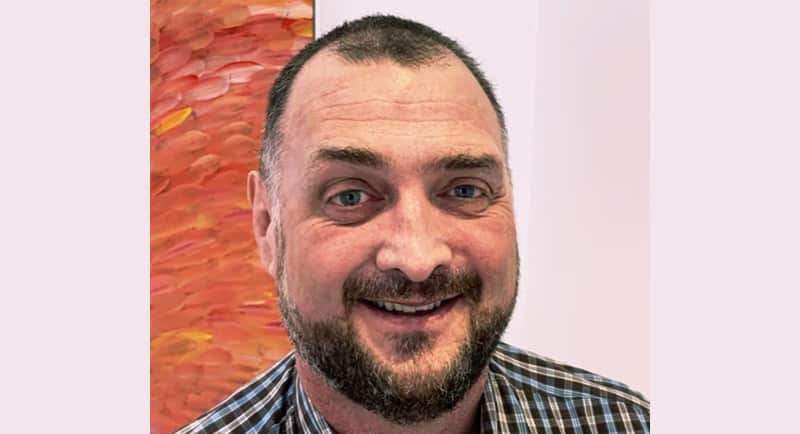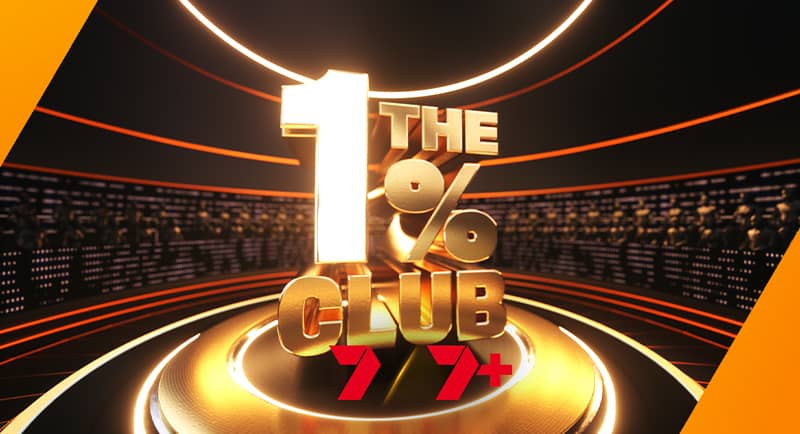For those of us ready to try a quiz show that’s a bit out of the norm, The 1% Club premieres at 7:30 pm Wednesday, 26 April on Channel Seven and 7plus.
Hosted by comedian Australian Jim Jefferies, each payer starts with $1000 in the bank. If they get questions wrong, they are eliminated and their money goes into the prize pot. Throughout the game, contestants will be offered a chance to use the $1000 to purchase a question pass, or cash out and walk away with their money.
Whoever makes it to the end of the game will get to answer a question only 1% of the population can answer correctly. If they get it right, they can take home up to $100,000 and join The 1% Club.
Mediaweek spoke to executive producer from BBC, John Leahy, about crunching the numbers and joining the club.

John Leahy
The original version of the format is from the UK, and Australia is the second English language market to pick the show up. Leahy says that there are some differences between the Australian and English versions of The 1% Club.
“The British show is a tremendous classic British primetime show with comedy – but it’s a primetime game show. While it’s a great laugh, we decided we wanted to have a really fun entertainment show that had a game show through the middle of it as its spine, as opposed to purely just a game show.
“It’s shiny floor, it’s fun, but it’s not just ‘what’s the capital of Iceland?’ – it’s not about stuff you’ve learned by rote, it’s about how you look at things.”
Taking the reins as the show’s host is comedian Jim Jefferies. As for how Jeffries ended up on board as The 1% Club host in the first place, Leahy says that he is “a host and a person that all production companies were searching for,” and was a perfect fit despite this being his first time as a game show host.
“He’s never hosted a game show, he even said ‘who the hell wants me to host a game show?’, but we’ve got together and we figured out the path.
“For our one-hour episodes, Jim was in the studio for four and a half hours keeping that audience going. When you’re asking all of these random questions, people have adjudication questions – our question team would say, ‘we’ll check that,’ and while checking, Jim was chatting to our audience, keeping them warm, doing stand-up, and having a laugh. He’s a legend. Everyone left that studio after four and a half hours saying ‘I had a great time’.”
With the focus not on what you know, but rather on how you think, the people behind the scenes have their work cut out for them. Coming up with questions that require lateral thinking rather than general knowledge involves walking a tightrope between puzzles that anybody can answer and ones that are near on impossible.
Leahy even says that Jim Jefferies had a lot of fun at the question makers’ expense – “he says the question makers are a funny mob!”
“It’s a team of really dedicated, clever people,” says Leahy. “These questions have to range from what 90% of people will get right through to the 1% of the population. There’s a significant testing process by way of production. When I first saw this show, I thought it was brilliant, but if 100 people get the first question wrong, there is no show.
“We have a range of writers and producers who create the questions that we estimate are going to be in the bands – 90% of the population, 80% 70%, etc, down to 1%. Then we send it to survey. There are three different assessments before the final survey, and when we’re certain we have our final questions, we send them to 1000 people. That then creates our ranking.”

Of course, even the best question writers can’t account for how every single person thinks.
“There was one question in the course of the series, and I won’t say in what episode, where we had a specific answer that the survey had dictated to us. Our contestants came up with an alternate answer which we didn’t have, but our adjudicators and our quiz people looked at it and decided that technically their answer is also correct. So because we want to always be positive, we allowed everyone through on that.”
As well as the UK and Australia, The 1% Club format has been licenced to France Televisions in France, Kan in Israel, RTL in the Netherlands, Atresmedia in Spain, and SevenOne Entertainment Group in Germany. Leahy attributes the rapid success of the show to one simple fact: “it’s just fun.”
“When you watch it with more than one person, it becomes a different game. When you’re watching it on your own you’re internalising the answer – with somebody else in the room, whether it be your granny or your child, everyone’s got a view. It becomes a collaborative game that you play at home.
“You don’t have to have been dux of the class, or the chairman of Mensa to participate in this game. There’s no hierarchical class structure in this game, anyone can play. When you see the answer, you don’t go, ‘oh, I’m dumb,’ or ‘they’ve tried to trick me with something clever’. You just go ‘of course, I didn’t see’. I think that’s why it’s so accessible.”
–
Top Image: Jim Jefferies
